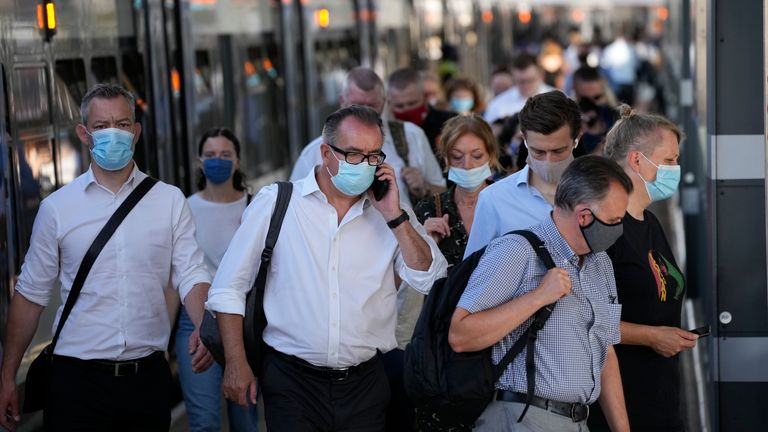COVID-19 will 'circulate for decades and probably centuries', health expert says
"The problem is that many people still believe we can get to a point where there is no risk with this, where we can have zero COVID," says Professor Paul Hunter.
Monday 26 July 2021 23:10, UK
COVID-19 will be a part of life for decades and possibly centuries, according to a health expert.
Paul Hunter, professor of health protection and medicine at the University of East Anglia, told Sky News that being able to control the spread of the virus long-term was unlikely.
He said: "The problem is that many people still believe we can get to a point where there is no risk with this, where we can have zero COVID.
"If you look at the other coronaviruses, of which there are four main ones in circulation in humans, these are viruses that infect us repeatedly throughout our lives - probably every two, three, four, five, six years - so at some point we will have to stop trying to control the spread of the virus.
"I don't think we're at that point yet.
"If we're going to maintain ourselves at this epidemic equilibrium - where we live in balance with this virus - at some point we've just got to say: okay, we've done as much as we can... we've done what we need to do to protect people's health and this virus will continue to circulate for decades and probably centuries."
Also on Monday, a study was published that gave a clearer picture of just how dangerous the Delta variant - which was first seen in India - can be.
Chinese researchers tracked a recent outbreak in China and found that those infected with Delta carried 1,260 times more virus in their noses, compared to those infected in the pandemic's first wave.
This higher load means the virus spreads more easily: the interval between when people were exposed to a carrier and when they themselves were diagnosed fell from an average of six days last year to just four days during the Delta outbreak.
Shane Crotty of the La Jolla Institute for Immunology in San Diego, who was not involved in the study, said that it showed the Delta variant is "outcompeting all other viruses because it just spreads so much more efficiently".
Despite that, the number of new cases in the UK - where the Delta variant is dominant - fell for the sixth consecutive day on Monday, a sign that vaccines might be playing a major role in helping the country get closer to normal.
But Professor Devi Sridhar, chair of global public health at Edinburgh University Medical School, said the vaccine was not enough by itself to bring the situation under control.
She told Sky News: "I think relying on vaccines isn't great - the vaccines aren't 100% protective - people have tested positive and got ill even after being doubly-vaccinated.
"But they are a crucial building block for the response.
"For the short term we're continuing to see employers asking employees to wear face masks in buildings to prevent transmission, continue to distance, to get outside - and that is also helped with good weather.
"So I think relying only on vaccines obviously is a problem, but I think it is obviously the building block of how we emerge from the crisis and try to move forward."





